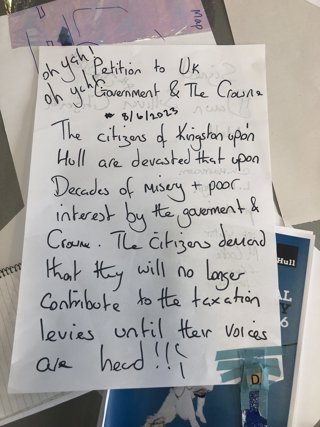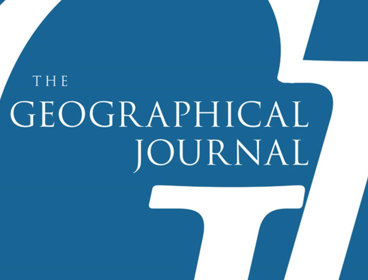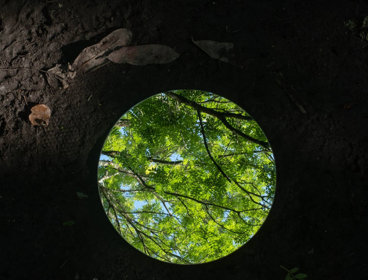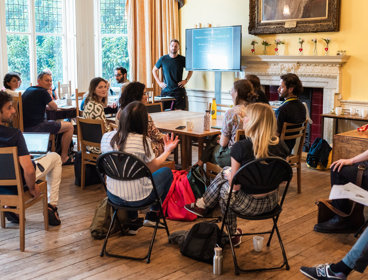To mark Earth Day today, we're featuring a recent article from Area, one of our leading international journals, exploring a community-led archive-based workshop on Hull’s flood histories.
As climate warms, both extreme drought and flooding events are becoming increasingly common. Here in the UK, Dr Hannah Worthen, a historical geographer, and Claire Weatherall, an archivist, have collaborated to help communities better understand Hull’s flood histories, helping grow climate consciousness and empowering people to take action.
Working as part of the Risky Cities project, in 2023 they and the project team co-designed a one-day workshop, named Watery Archives, held at the Hull History Centre. Participants explored Hull’s flood histories through historical maps, newspapers, petitions, and borough records. Bringing their personal stories to these archives, participants produced creative maps to critically engage with flooding and climate resilience.
Working together to enable community-led research
Watery Archives emerged through the Risky Cities project where the connections between the University of Hull, Hull History Centre and local communities were strengthened.
For Claire and Hannah, the partnerships between the public and academic and heritage organisations are powerful. The collaborations accelerate reach; the history centre provides access to Hull University Archives, Hull City Archives and local studies collections to serve a range of audiences, from academics and students to local historians and the wider public. Also, whilst the history centre is accessible, the public do not always know how to access and decipher archives. Through their workshop, Hannah and Claire tackled these barriers to engagement, inviting people to explore archives and share essential skills, such as reading early modern English.
The workshop explored how arts and humanities methods can help with climate action and flood resilience. It was also about how the university could bring audiences to the archives service. We invited communities into the archive to explore how they can do their own research - we wanted to break down barriers that people have using archives themselves.Hannah
Bringing together the past, the present and the future: a learning histories approach
Exploring Hull’s flood histories collaboratively enabled participants to reflect on the resilience of their city today and into the future.
This is called the learning histories approach, which is about using history to have conversations with communities in the present, bringing the past and present together to inform each other.Hannah
This approach provides an opportunity for growing meaningful audience engagement at archival organisations. Rather than talking at the public about historical materials, a learning histories approach encourages academics and archivists to step back, allowing people to make their own discoveries.
Traditionally, archivists have approached audience engagement design from a perspective of “this is what we have, this is what it can tell you.” Learning histories is about stepping back and just seeing how people respond to something.Claire
Promoting environmental awareness through place-based local histories
Through their research and workshops, Claire and Hannah found that inviting local communities to co-create an environmental history of their city can help grow climate consciousness. Connecting the public with the flood histories of Hull meant they could consider its current resilience in tangible ways.
Allowing a participant to explore personal stories instead of talking at them makes the research more meaningful for them. Place-based local histories also mean we can go beyond the general conversation about climate change and enable people to act.Hannah
Despite Hull’s rich maritime past, its river is obscured in much of the city and its connections with water aren’t always obvious. Through their explorations of Hull’s flood histories, participants were able to reflect on these connections, past, present and future.
Archival materials brought Hull’s watery past to life, encouraging discussions about the flood challenges facing the city today. For example, an early modern petition calling for funds to protect Hull from flooding prompted participants to reflect on the city's current climate resilience. From this, they created activist petitions, exploring key environmental issues facing Hull today and into the future.

Community-led and place-based historical research is a powerful tool for developing climate awareness in communities. However, this is challenging work, requiring substantial investments of time and resources by staff. Overcoming these challenges is essential if we are to drive impactful participatory research into the future.
Next steps
This workshop emerged from the wider UKRI funded Risky Cities project exploring the power of arts and humanities methods in engaging communities in climate resilience. Funding was provided for this project by the Arts and Humanities Research Council, the UK Climate Resilience Programme and the University of Hull.
Hannah is currently working on Community Waterscapes, a new project collecting and representing the watery stories of Hull. Claire is now preparing for the University’s centenary in 2027, which will include exhibitions co-produced by students, alumni, and the public. In the near future, Hannah and Claire hope to collaborate again.
We regularly spotlight recently published research from one of the Society’s leading international journals: Area, The Geographical Journal, Transactions of the Institute of British Geographers, and Geo: Geography and Environment. Take a look at our other articles here.
This research spotlight article was written by Safia Bailey (Cardiff University).



